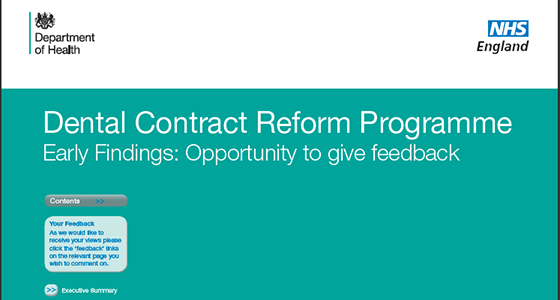 Alexandra Lyne (Lexy) qualified from Manchester University and is currently doing a DF1 year in London.
Alexandra Lyne (Lexy) qualified from Manchester University and is currently doing a DF1 year in London.
A few practices in the area are on the pilot scheme for the new contract, and there has been a lot of discussion between the foundation dentists and trainers about what the future will be like under the new contract.
Ask a dentist, 'what makes a good dentist?', and you're likely to get an answer along the lines of excellent clinical work. Ask a patient; you're likely to hear about bedside manner or painless injections. Ask the Department of Health; you're probably going to get an incomprehensible paragraph of legal jargon that equates to 'One who does the least dentistry possible.'
You can see where each is coming from; as dentists ourselves, we want to be doing excellent work that we are proud of. Patients want us to be understanding and make their visits as pleasant as possible. The Department of Health wants to keep to budget.
The last two NHS Dental Contacts have been fee per item; even the UDA system just took the old 400+ fee items and combined them into 3 (1). Both contracts essentially pay dentists for doing more restorative procedures. This way a good (or perhaps successful) dentist is one who does good quality restorative work.
One of the aspects of the much-anticipated new contract, however, appears to reward prevention (2). So suddenly, we will get paid to avoid doing advanced work. A good dentist becomes one who has prevented the most disease; i.e. one who has done the least intervention. At University, we'd often discuss the work of our tutors or consultants, adoringly sighing 'you should have seen his crown preps, absolutely perfect. I wanna be that good.' I wonder how this will change as dentists start getting rewarded for preventative dentistry. Will keynote speakers at conferences be introduced as "Dr Barnes, who has not picked up a drill in over six months" to gasps and applause from a crowd of average still-doing-20-fillings-a-month GDPs?
 NHS contract reform programme - see reference 2
NHS contract reform programme - see reference 2
I'm not passing judgment, by the way; prevention over intervention is a no-brainer in terms of our patient's oral health. Every time I place drill to tooth, I can't help but think of the ensuing restorative cycle of doom, that will one day end with me holding a pair of forceps saying "Now, you're going to feel a lot of pressure...". We have been conditioned from day one of dental school into a preventative mindset, and Black's 'extension for prevention' appears positively barbaric (3). I don't deny the logic in financially incentivising dentists to spend more time undertaking prevention with their patients.
So let's say this new system works, we love it, and dentists are churning out patients with little to no dental disease. Brilliant, that's indisputably in the patients' best interest. I do wonder though, what this is going to do to private dentistry. Assuming that will always remain a fee per item system, and therefore financially rely on intervention. At a recent talk by Asif Syed at a Foundation Training day, we were told that the best business model for a mixed practice was to exponentially increase your private income, by (ethically) selling private work to more patients (4). But if, years down the line, there is so much less dental disease in our population (because of all the fantastic successful preventative work we've been doing), where will these potential private patients come from? So now, as well as our NHS income not increasing, it'd also be much harder to find any patients needing private work.
Of course, dentistry can be traced back through history, with evidence of fillings found up to 6500 years ago (5). Practically every population on Earth has some incidence of dental disease, and one new Dental Contract in the UK isn't going to change that. However, small studies have suggested that populations with low dental disease do not utilise dental services (Adulyanon et al, 1996, studied 501 low caries individuals in rural Thailand (6), so you could argue that by improving the dental health of the country, we will end up decreasing the demand for our own services.
That is a rather dystopian look at the future, of course (perhaps I've been reading too much into Brave New World), but it's an intriguing concept. Obviously, successful prevention will always be dependent on patient compliance (and let's face it, Cadbury's isn't getting any less tasty), and I'm sure in our lifetime we will still see those wonderful patients who, no matter what we advise, treat their toothbrush like it's an instrument of torture, smoke like it's not a form of suicide, and ingest sugar like its necessary for respiration.
In reality, I think the shift towards prevention will lead to dentistry slowly being seen as more of a counselling healthcare profession, rather than a surgical specialty. In dental school, students will perhaps be assessed more on the way they advise and talk to patients, and less on their clinical competence and procedure totals. In journals, case presentations may show photographs of mouths with no evidence of disease over several years, with the clinician proudly declaring, 'I did this!' Which, as I say, is not a bad thing.
Whether we like it or not, as emerging young dentists, our industry is going to change drastically in our working lifetime. So run along my friends, be good little dentists and aim to do the least dentistry you can!
Alexandra Lyne (Lexy)
[email protected]
Dental Protection is the leading indemnity provider.
Find out more
Disclaimer
Every effort has been made to ensure the accuracy of this website. The thoughts of this author and others are purely those of the author and not that of DPL.
References
1_ 2008. Dentistry Overview: Briefing Notes on NHS Dentistry.
2_ Department of Health, 2013. Dental contract reform programme: early findings and opportunity to give feedback. [online] HMSO. Available at: www.gov.uk [Accessed 17 November 2013].
3_ Joseph R., 2005. The Father of Modern Dentistry - Dr. Greene Vardiman Black (1836-1915). J Conserv Dent;8:5-6.
4_ Syed, A., 2013. Dental Careers and Practice Management, Speech given at Cumberland Lodge Vocational Dental Training Day 04/10/2013, unpublished.
5_ Barras, C., 2012. Oldest dental filling is found in a Stone Age tooth. [online] New Scientist. Available at: www.newscientist.com [Accessed 17 November 2013].
6_ Adulyanon S. et al, 1996. Oral impacts affecting daily performance in a low disease Thai population. Community Dent Oral Epidemiol 1996 Dec; 24(6): 385-9